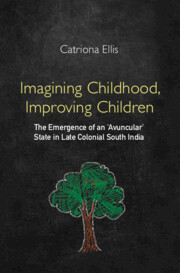 Imagining Childhood, Improving Children
Imagining Childhood, Improving Children Book contents
- Frontmatter
- Dedication
- Contents
- Acknowledgements
- List of Abbreviations
- Introduction
- 1 The Child at School: Compulsory Education in the Madras Presidency
- 2 Educating the Child: The Introduction of Compulsory Education in Madras City
- 3 Imagining the Child as Learner: Progressive Pedagogy in the Madras Presidency
- 4 Producing the Healthy Schoolchild
- 5 Saving the Child: The Madras Children Act, 1920, and the Beginnings of a Juvenile Justice System
- 6 Protecting the Poor Child: The Practical Expansion of Juvenile Justice
- 7 Defining Childhood: Sexual Parameters of Childhood
- 8 Remembering Childhoods: Childhood Memories in Autobiographies
- Conclusion: Children, Childhood and the Growth of the Avuncular State in South India
- Notes
- Bibliography
- Index
5 - Saving the Child: The Madras Children Act, 1920, and the Beginnings of a Juvenile Justice System
Published online by Cambridge University Press: 19 April 2023
- Frontmatter
- Dedication
- Contents
- Acknowledgements
- List of Abbreviations
- Introduction
- 1 The Child at School: Compulsory Education in the Madras Presidency
- 2 Educating the Child: The Introduction of Compulsory Education in Madras City
- 3 Imagining the Child as Learner: Progressive Pedagogy in the Madras Presidency
- 4 Producing the Healthy Schoolchild
- 5 Saving the Child: The Madras Children Act, 1920, and the Beginnings of a Juvenile Justice System
- 6 Protecting the Poor Child: The Practical Expansion of Juvenile Justice
- 7 Defining Childhood: Sexual Parameters of Childhood
- 8 Remembering Childhoods: Childhood Memories in Autobiographies
- Conclusion: Children, Childhood and the Growth of the Avuncular State in South India
- Notes
- Bibliography
- Index
Summary
The children considered in the preceding chapters were part of what could be categorised as an expected interaction with the modern state. The next two chapters consider a much smaller group of marginalised children whose interactions with state institutions were based on their perceived criminality or extreme poverty, who were subjected to the penal gaze of the state, who were not merely to be moulded into future citizens but who needed to be saved much more directly from their current circumstances.
Though there had been previous attempts to engage with juvenile justice, the Madras Children Act, 1920 (MCA) marked a new beginning in both thinking and practice surrounding children in contact with the law and the perceived responsibilities of the state towards such children. The act was the first to afford a distinct legal status to children; it legally defined the child as different from adults and initiated the expansion of a justice system centred on the specific needs of the child. These changes will be analysed by considering the discourses surrounding juvenile justice and the construction of the child as a ‘delinquent’ or ‘destitute’, as an object of reform, an object of welfare or a future citizen with rights. The chapter interrogates the aspirations of both colonial and Indian penal reformers and legislators, seen in documents such as the 1919–20 Indian Jails Committee (IJC), academic writings on juvenile justice and then in the content and significance of the 1920 act itself. Mirroring the methodology of the education chapters, these notions are set alongside a profiling of juvenile crime in court and administration records and then a detailed study of the act's practical consequences for the bodies and minds of children through the expansion of government-funded certified school provision. The role of civil society groups will be analysed in more detail in Chapter 6.
The 1920 act reflected a decisive shift as the state decided it had a duty to intervene in the lives of children because they were in particular need of ‘care’ or ‘control’. This was not a moment when the ‘juvenile delinquent’ was discovered as a social menace with the recognition of urban youth crime as a particular social problem as in some other British colonies such as Nigeria. Nor does it reflect the complex anxieties about the moral reformation of middle-class youth increasingly drawn to political nationalism.
- Type
- Chapter
- Information
- Imagining Childhood, Improving ChildrenThe Emergence of an ‘Avuncular’ State in Late Colonial South India, pp. 125 - 152Publisher: Cambridge University PressPrint publication year: 2023


